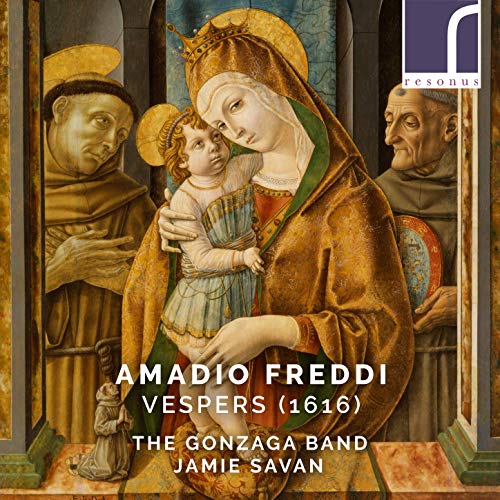The Gonzaga Band, Jamie Savan
58:10
resonus RES10245
+ Castello, Donati, A & G Gabrieli, Grandi & Biagio Marini
This recording is another triumph for Jamie Savan and his Gonzaga Band. The research on Freddi and the way the performing edition for these elegant and tuneful movements – largely taken from Freddi’s Messa, vespro et compieta (Venice: Amadino 1616) – is excellently presented in five dense pages of informed and practical scholarship of a high order, which informs the whole enterprise. This is a model of how scholarship and performance should complement one another
We are given details of the sources, editions, instruments, pitch and temperament used. Particularly interesting is the use of a digital Hauptwerk organ running samples from the Nachini organ in S. Maria d’Alleito at Isola in Slovenia and played by Steven Devine. In a recording that itself is digitally created, I can see nothing wrong with using such an instrument, though I wonder what it feels like to sing or play next to it where there is no wind reservoir ‘breathing’ with you. The only other instruments alongside the six voices are Jamie Savan (cornetto) and Oliver Webber (violin), who play Freddi’s entwined and imitative writing in a way that not only imitates the florid vocal lines, but gives the impression of a very much larger instrumental ensemble. The richness of the overall texture created with such slender resources is one of the appealing things about this performance.
Just a violin and a cornetto with the organ was what Freddi had at his disposal when the forces at S. Antonio, Padua where he worked from 1592 to 1614, were reduced to keep the music establishment solvent. The combination appears again as the basic instrumental group hired in for the feast of the Assumption at S. Teonisto in Treviso, where he had moved in 1615, and is a combination that appears in places in the writing of Heinrich Schütz, for example.
The psalms Savan has chosen from the collection are those proper to a Vespers of the Blessed Virgin Mary, and as in the Monteverdi 1610 Vespers, he has interspersed the psalms with works for single voices, and a number of sonatas by Donati, Marini and Castello together with some brief intonazioni by Giovanni and Andrea Gabrieli and a motet by Grandi. This is welcome, as fascinating though it is to hear the Freddi works, the voice and instrument combinations are limited and the textures and idioms feel much more samey than the widely varied styles of Monteverdi’s work – but then Monteverdi was trying to display the maximum number of ways the plainsong could be treated, which was not part of Freddi’s game plan. After repeated listenings, I found the music tuneful but not essentially memorable, though some of the instrumental sonatas and the solo motet by Grandi raised the game.
As before with the Gonzaga Band, Fay Newton’s contributions steal the show. Hardly any other soprano has her wonderful voice: light, bright and flexible, yet capable of astonishing changes of colour and mood. This is not to say that the other voices are not excellent – they are equally well-matched. So this is another example of how to create a wonderful but largely unrecognised musical world, where voices and instruments combine to create big effects with minimal forces. In today’s financially squeezed circumstances there is much to lean and admire. Plus ça change.
David Stancliffe
Click HERE to buy this as a download on amazon, or HERE to order a CD version.
